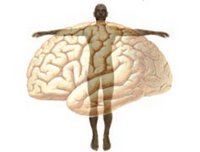 ffirm or deny a theory regarding the relationship between the mind and the body.
ffirm or deny a theory regarding the relationship between the mind and the body.Descartes’ Dualism assumes that the mind is distinct from the body. This assumption further presupposes that (1) the mind and the body exist, (2) the mental processes, which exist due to the existence of the mind, exist apart from the physical processes, and (3) the activity of thinking, which cannot be taken from me, is an activity of the mind (or a mental process), and not of the body. Consequently, Descartes’ Dualism claims that the mental processes are distinct from the physical processes, wherein a mental process is defined as the process that exists in the mind, whilst physical process as that which exists in the body.
Following the path Descartes made, since I am a thinking thing, I do that which I do, because I am a thinking thing. My existence, which is made possible by my activity of thinking, made possible the things I do (physically). As such, my act of thinking, which is a mental process, made it possible for me to undergo physical activities implying that the mental could give rise to the physical.
The common counter-argument to this is that it is questionable to account that the mental (if it is non-physical) could give rise to a physical event. If the mind is non-physical as how Descartes believes it to be, then it must be something that has no position in space and no corporeal nature. If it were so, it would indeed be questionable to say that physical activities (or that which my body does), which has a corporeal nature and a position in space, arise from this non-physical entity. However, it could be the case that we would find the impossibility of the mind-body distinction more acceptable because of our inclination to the Science of Psychology; that due to the influence of Science, we may attribute the mental processes to physiological events that are physical processes in themselves. This could be the case if our enquiry on the mind-body distinction would be limited to our enquiry on ourselves (as human beings). If we extend this to the existence of God based on Leibniz’ arguments, we could find an argument that supports the immateriality of the mind.
According to Leibniz, because I am a thinking thing, the one who made me must also be a thinking thing, for it is absurd that a non-thinking thing makes a thinking thing such as me. This thinking thing that made me must be immaterial, as Leibniz thought that ‘God as a material being’ is absurd. We must accept that if God is a thinking thing, it is impossible for Him to be composed of matter or of atoms that do not think in themselves. It would be unsound to say that a great thinking thing that made me is composed of matter that does not think in its own right. This argument supports the idea that thinking is not an attribute of the physical and thus, if it is an attribute of the mind, then the mind must be non-physical.
However, Leibniz’ line of argument is also questionable. Though it is able to come up at the idea that thinking is a non-physical process, it still presupposes the reliability of “causation”; it presupposes the necessity of the existence of a thinking thing that made a thinking thing such as me. But what if the idea of causation is false? – Then we could possibly[1] disregard that God is a thinking thing or that even God is. Furthermore, should we, of necessity, assume that a God as a thinking thing should not be composed of matter that does not think in its own right? Lastly, if the thinking thing that made me is solely immaterial, how can we grant its existence in material reality? How can a thing work in a material reality if it does not exist there?
At any rate, it seems easy for Descartes to arrive at an idea that the mind is distinct from the body; that the existence of the body is dubitable, whilst that of the mind is not, making the body only as an extension of my existence. Arguing along his path, if my two hands would be taken away from me, I would still be thinking. Such would still be the case if one will take away from me my ears, my feet, my eyes, nose, liver and lung (which made Descartes believe that thinking is the only attribute that cannot be taken from me). But if one takes away my brain and slices it into pieces, would I still be able to think? I suppose not.
Even if it could be proven that my act of thinking is independent of the other parts of my body (or of other physical processes), it does not follow that it is independent of some of my physical processes. It is actually hard to conceive of mental processes as independent of my brain. I neither disagree with Descartes’ Dualism as I admit, I may have been mistaken, nor fully agree with the materialist theories. It is just that Descartes’ arguments are insufficient and that the arguments of materialist theories are influential. As of now, I am inclined[2] to think that the mental processes, which includes thinking and are said to occur in the mind, are just identical with the neurophysiological processes happening in my brain – thus, I am inclined to think that the physical activities I do are caused by mental processes, which are also physical processes.
[1] a logical possibility, not a logical necessity.
[2] That I am inclined to this sort of thinking does not mean that I am affirming the truthfulness of the claim that ‘the mental processes are nothing but physical processes’. This is more of a critique than an affirmation of a claim.
No comments:
Post a Comment